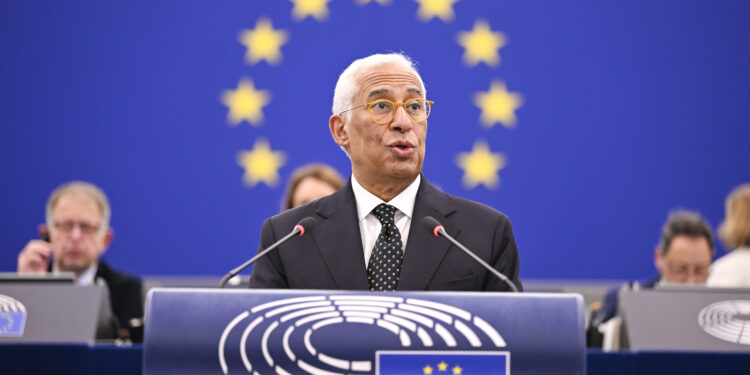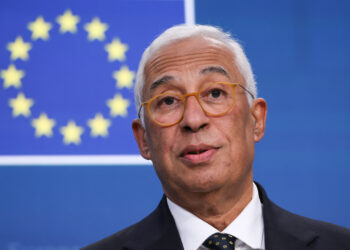From the correspondent in Strasbourg – All in all, the first time of António Costa, the new president of the European Council, in the Strasbourg EU Parliament went well. During a plenary debate this morning (Jan. 22), the former Portuguese prime minister outlined to MEPs the discussions during last December’s summit, where the main topics had been security, the EU’s relations with the rest of the world, and competitiveness.
Intervening after him in the chamber, he was echoed by the chairwoman of the Community Executive, Ursula von der Leyen, who has recently returned to the public spotlight after suffering pneumonia that forced her hospitalization in recent weeks.
Ukraine and enlargement
Among the main dishes on the menu at the last 2024 leaders’ summit (held Dec. 19) was Brussels’ support of Kyiv, personally guaranteed to Ukrainian President Volodymyr Zelensky. Costa reiterated before the chamber the EU’s commitment to support Ukraine “for as long as necessary, no matter what, for a comprehensive, just, and lasting peace.”
And then the enlargement, called by the president of the European Council “the greatest geopolitical investment for peace and security, for our people and our continent.” arguing (as did Enlargement Commissioner Marta Kos a couple of weeks ago) that “the six countries of the Western Balkans, Ukraine, and Moldova are working hard to fulfil their commitments” and, therefore, “it is time for us to keep our promises.”
The United States of Trump
As for the external role of the EU, Costa stressed that “we must work for a stronger transatlantic relationship,” continuing somewhat in the vein of debates that animated the chamber yesterday about the consequences that a second presidency of Donald Trump will have in the relations between Washington and Brussels. The one between the EU and the U.S. is “a partnership that has sustained peace and economic growth for decades, based on shared values and common interests,” and it is in the interest of both blocs to “continue to promote stable, balanced and predictable trade relations.”
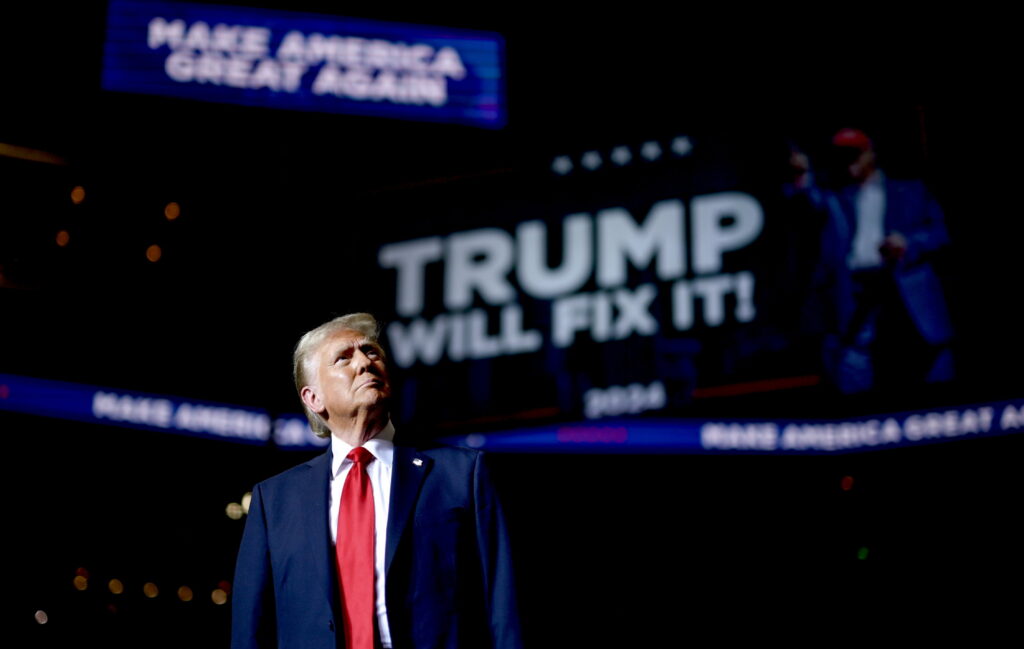
It was a way to pour oil on troubled waters and to extend an olive branch to the new U.S. administration, which has threatened the imposition of heavy tariffs on imports from the Old Continent but with which Costa said he looks forward to working “to pursue positive and fair economic cooperation and to work on our shared priorities for prosperity and security.”
But there was also room to remind the new White House tenant, between the lines—that recently floated his intention to annexe military manu Greenland (autonomous territory of Denmark)—that Europe remains “a pillar of the rules-based international order,” chief among which are “the principles of sovereignty, territorial integrity and inviolability of borders,” as enshrined in the United Nations Charter. Costa threw another dig at the New York-based tycoon by stressing that the Twenty-Seven continue to observe their international commitments, starting with the Paris climate agreement from which Trump has withdrawn the United States for the second time.
“No other economy in the world is as integrated as the European and American economies,” agreed Commission Chairwoman Ursula von der Leyen, according to whom the priority in relations with the United States will be to “discuss common interests and be ready to negotiate.” In such negotiations, she assured, “we will be pragmatic in seeking common ground,” but—her promise to the deputies, sounding almost like a warning to the White House—”we will always stand by our principles.”
The New World
However, speaking about the international context in which the EU will have to move in the coming months and years, Costa also reiterated another theme dear to his heart, already expressed a couple of months ago on the occasion of the handover from his predecessor Charles Michel: “Today’s world is multipolar and opens new opportunities for Europe,” he said, and in this context the EU “must strengthen its bilateral and multilateral relations with third countries, on the basis of common interests, mutual prosperity, and shared priorities.”
Von der Leyen also agreed with him: “We have entered a new era of tough geostrategic competition,” she said, noting that “the rules of engagement are changing.” As laid out yesterday at the World Economic Forum in Davos, Brussels is increasingly insisting on looking to Beijing and New Deli for its business should trade relations with Washington deteriorate.
The difficult international conjuncture was also emphasized by Green co-leader Bas Eickhout: “In the East, there is a dictator starting wars, in the West a capitalist autocrat; in the Middle East there is great chaos,” he said. In this context, “we need a strong Europe,” he added, but unfortunately, in his view “, the European Council is passive, at least in reading the conclusions of the December summit.” Satisfied with the direction the Twenty-Seven are collectively taking, especially with regard to the white-hot migration dossier, however, is Conservative (ECR) co-leader Nicola Procaccini.
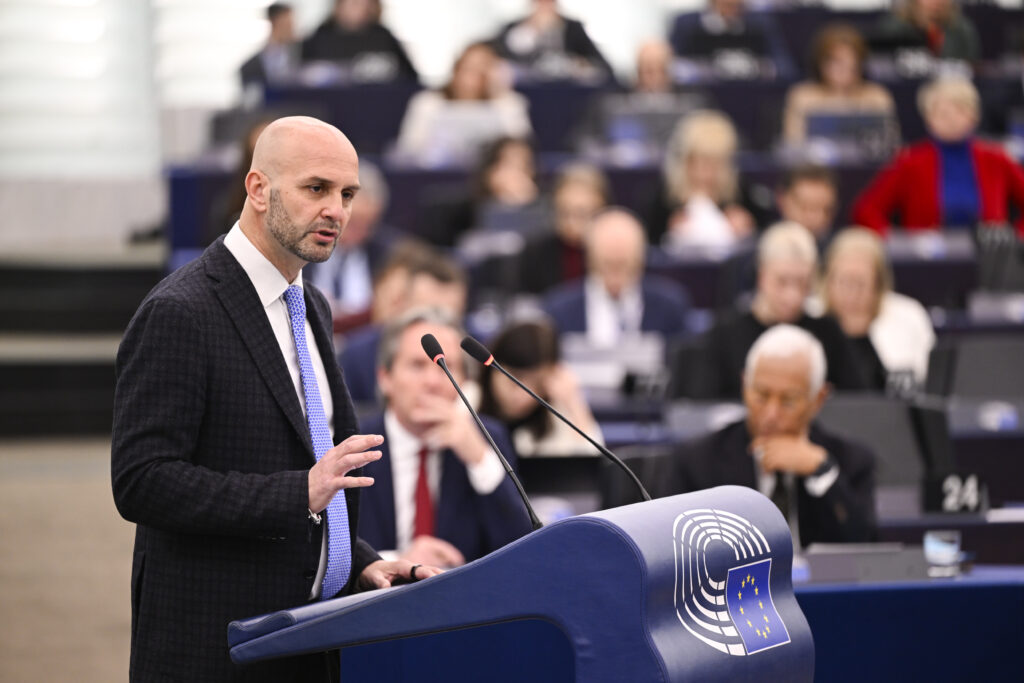
“European governments finally realise the urgency of taking concrete measures to combat illegal immigration,” he certified in the chamber, adding that we need to “deal with the phenomenon outside Europe’s borders” on the model of the repatriation centres pioneered by Italy in Albania. For the Melonian MEP, it is about the “geopolitical destiny that Europe must give itself,” namely that of “being present in Africa and Asia with its own policy, with its own productive and commercial enterprises,” in short, what von der Leyen is trying to do in China and India.
The focus on defence
Another key issue at the December European Council was defence. “To preserve peace” on the continent, Costa reminded MEPs, “we must take greater responsibility for our defence, our strategic autonomy, our sovereignty.” “Since 2014, and especially after 2022 (i.e. at the time of Russia’s unilateral annexation of Crimea, and then the large-scale invasion of Ukraine also by Moscow, ed.), member states have increased their defence budgets,” he said with satisfaction, pointing out that the 23 countries that are part of both the EU and NATO have met or exceeded the target of 2 per cent of GDP to be devoted to military spending agreed upon by the North Atlantic Alliance.
The new European line on defence is, in fact, blessed (or at least endorsed) by almost all political groups in the hemicycle. At the same time, it is instead branded as bellicose by the radical left: “I believe that spending together on military defence helps to spend less and better,” Procaccini said again, adding that “to be able to guarantee peace and freedom, you need to be ready to defend them.”
Defence, we hear this everywhere, will be a priority for Europe in the coming years. It is the watchword of the Polish presidency semester of the Council but also that of the Commission, which has already developed the Strategic Compass and presented an industrial program to strengthen the economic and productive sector.
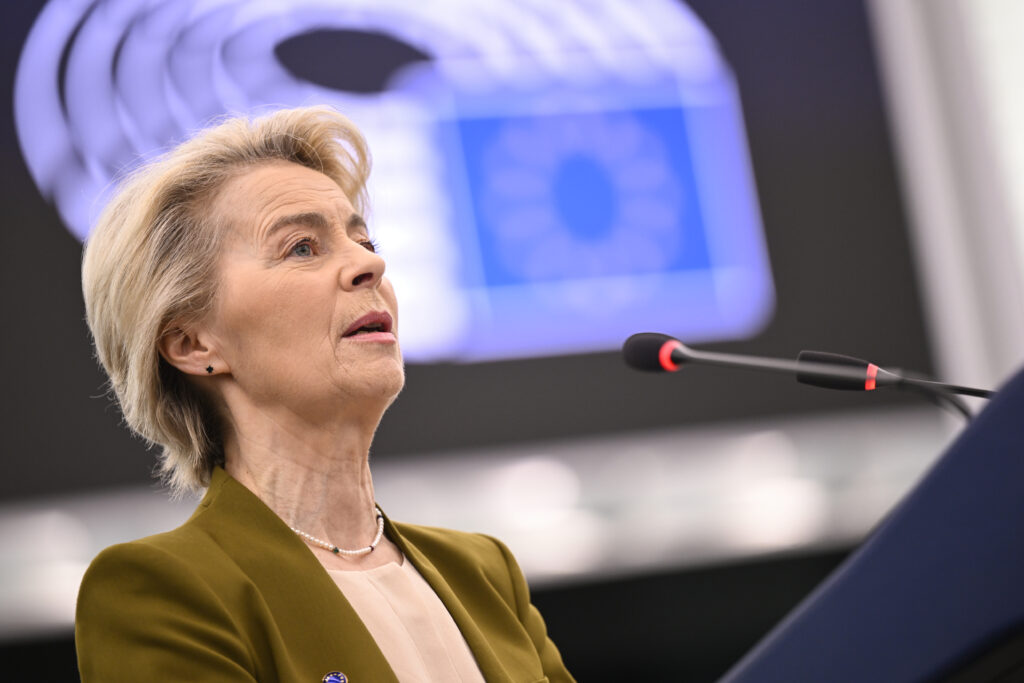
In short, “there is a general sense of urgency and strategic purpose among us,” Costa explained, adding, “We are on the right track to build a Europe of defence.” That is why he dedicated the first informal retreat of the heads of state and government—a new format introduced by the former Portuguese premier to help leaders focus discussions on specific issues—scheduled for Feb. 3 to the topic.
On that occasion, how to “become more resilient, more efficient and more autonomous” will be reflected upon, and the results of that meeting will later feed into the White Paper on Defence being worked on by EU High Representative Kaja Kallas and Defence Commissioner Andrius Kubilius.
The Compass of Competitiveness
After all, the European Council president noted, “Defence and competitiveness go hand in hand” as “investing in defence in an integrated way can boost our economies.” This is also and especially what the next summit of the Twenty-Seven leaders, scheduled for March 20-21, will address.
Von der Leyen also elaborated on this nexus. To safeguard the single market, it is necessary to translate Mario Draghi’s report must be translated into concrete actions. To this end, she will present a new “Competitiveness Compass” next week, intended to become “the North Star of the new Commission” for the next five years.
The plan includes three goals: “First, closing the innovation gap with our competitors; second, a joint roadmap for decarbonization and competitiveness; and third, strengthening our resilience and economic security,” the head of the EU executive said in front of the hemicycle.
On the first point, we need to unravel the “vicious cycle between low investment and low innovation,” which is responsible, among other things, for the Old Continent lagging in the global race for digital technologies. The solution is to “improve coordination between the European level and the member states” regarding public investments. Still, since these alone will not be enough, it will be necessary to supplement them with private capital. To achieve such a synergy, von der Leyen announced the imminent launch of the “Savings and Investment Union“, which is the realization of another report presented last April by a former Italian premier, Enrico Letta.
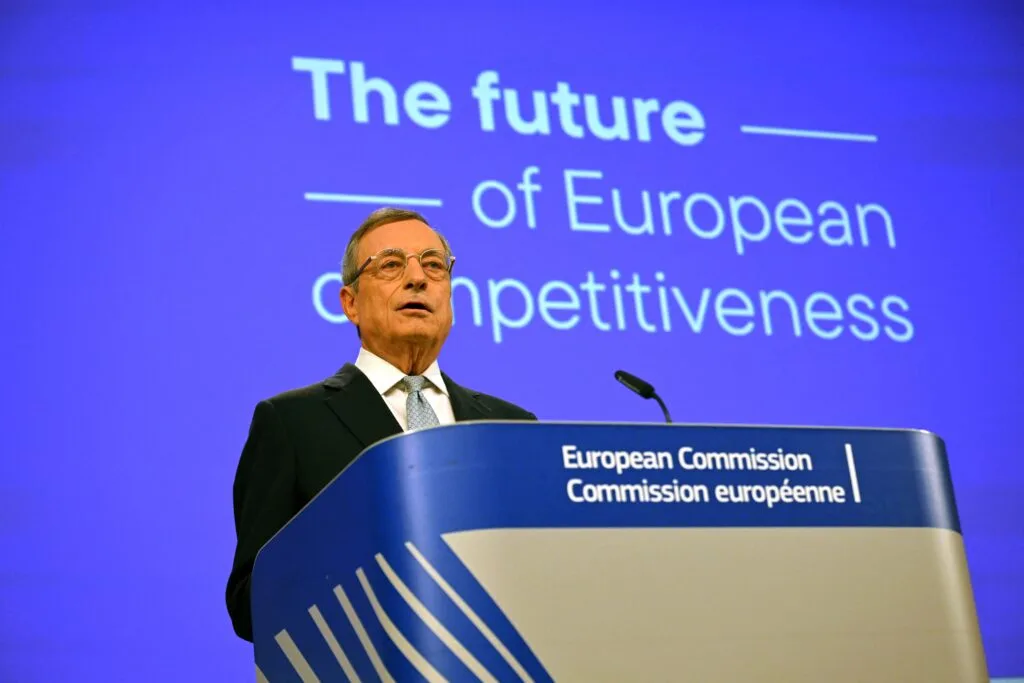
To achieve the second goal—cutting energy prices and the concomitant abandonment of fossil fuels (only Russian ones, though, while buying natural gas from other countries does not seem problematic)—von der Leyen proposes to “continue to diversify our supplies” and to “invest in next-generation clean energy technologies” such as nuclear fusion, advanced geothermal, and solid-state batteries. And, of course, “modernise our grids and storage infrastructure“, including through private investment, to finally build the Energy Union. The Berlaymont’s plan for the energy side will come in February.
Finally, to “strengthen our economic resilience and security”, as many trade agreements as possible “with partners worldwide should be suggested to ensure our access to raw materials.” Von der Leyen claimed the conclusion of “three new partnerships with Mercosur, Mexico and Switzerland” and the start of negotiations with Malaysia. As noted in the Swiss Alps yesterday, these agreements “open up new and dynamic export markets” but, most importantly, “ensure our access to essential minerals and clean energy,” indispensable ingredients for advancing the double green and digital transition.
English version by the Translation Service of Withub